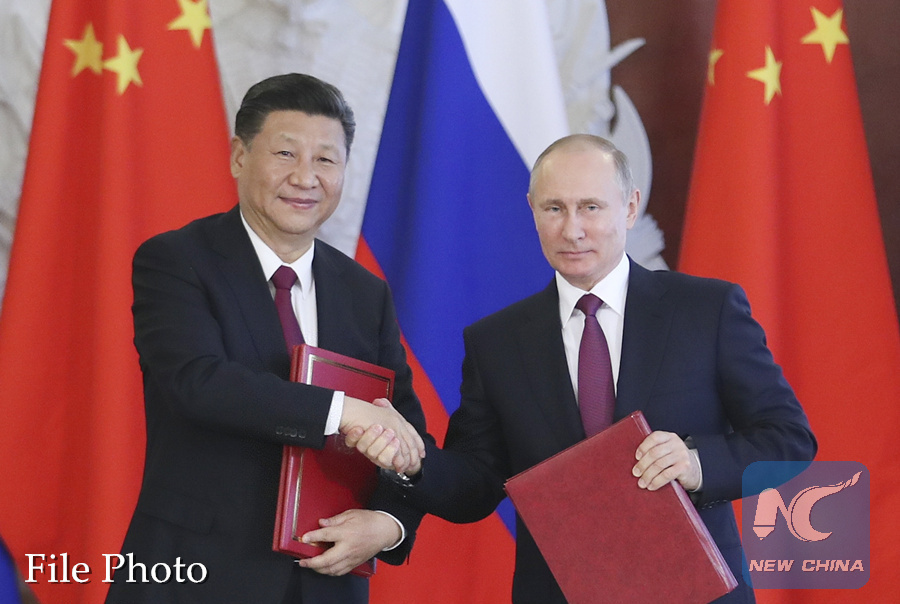
Chinese President Xi Jinping and his Russian counterpart Vladimir Putin attend a signing ceremony after their talks in Moscow, Russia, July 4, 2017. (Xinhua/Xie Huanchi)
ST. PETERSBURG, Russia, May 24 (Xinhua) -- Chinese Vice President Wang Qishan arrived in Russia Thursday to start his first foreign visit after taking office, during which he is scheduled to attend the 22nd St. Petersburg International Economic Forum (SPIEF) and meet with Russian leaders to discuss bilateral ties and issues of common concern.
As interactions between China and Russia are becoming increasingly frequent and fruitful, the two countries will certainly continue to gain momentum in strengthening bilateral ties, which paves the way for upgrading their trade and economic cooperation, experts said.
STRONGER COMPREHENSIVE STRATEGIC PARTNERSHIP
On account of solid political trust, a stronger comprehensive strategic partnership between China and Russia has emerged in recent years.
According to the latest official data, China remains the largest trading partner of Russia for eight consecutive years, with the volume of bilateral trade in 2017 rising by 20.8 percent to 84.07 billion U.S. dollars, and the figure expected to exceed 100 billion in 2018.
"There is a certain improvement and development of the trade turnover structure ...In the long term, the goal of 200 billion dollars will be reached," said Sergei Uyanayev, deputy director of the Far Eastern Studies Institute at the Russian Academy of Sciences.
The further development of bilateral economic cooperation in traditional spheres, especially in the energy sector, speaks in favor of such a scenario. The second stage of the Yamal liquefied natural gas (LNG) plant is expected to be launched this year, and the transportation of Russian gas along the eastern branch of the "Power of Siberia" gas pipeline will begin in 2019, along with the expansion of the Skovorodino-Daqing oil pipeline.
The two sides are also actively implementing major strategic projects in nuclear energy, infrastructure and aerospace, while cooperation in fields such as finance, agriculture, science and technology, innovation and cross-border electricity has been thriving as well.
In addition, various agreements have been reached by the two countries to jointly develop the Arctic region and the Far East, which will also stimulate regional cooperation.
"China is perceived (by Russians) as the most reliable and reasonable business partner," said Alexey Maslov, head of the Oriental Studies Department at the Russian Higher School of Economics Research University.
NEW OPPORTUNITIES WITHIN MULTILATERAL FRAMEWORKS
The pairing of the Belt and Road Initiative and Eurasia Economic Union (EAEU) in recent years has turned into an important part of the whole complex of Russia-China interaction.
"It was the launching pad for new projects, such as the Moscow-Kazan speed railway and the Northern Sea Route. It also incorporated and gave new impetus to the well-known former joint programs, including those related to cooperation in the Russian Far East," Uyanayev said.
Last week, China and the Russia-led EAEU signed an agreement on trade and economic cooperation, the first major systematic arrangement ever reached between the two sides.
"Now the EAEU and China have a common legal basis for further development of cooperation in a number of areas," said Timofei Bordachev, an expert at the Valdai International Discussion Club.
Other multilateral mechanisms, such as the Shanghai Cooperation Organization (SCO) and the BRICS, are also good opportunities to coordinate interests among Eurasian countries, experts said.
"The SCO can be one of the core regional links both within the global BRICS+ project and within the framework of Eurasia in the formation of an integration and cooperation platform for all the developing countries of the Eurasian continent," said Yaroslav Lissovolik, chief economist of the Eurasian Development Bank.
The bank is now considering taking part in major projects between China, Russia and other EAEU countries within the scheme of pairing the EAEU and the Belt and Road Initiative, he added.
"It is very important that bilateral and multilateral mechanisms were promptly established, within the framework of which the parties began to work meticulously to find mutually beneficial options for cooperation," Uyanayev said.

